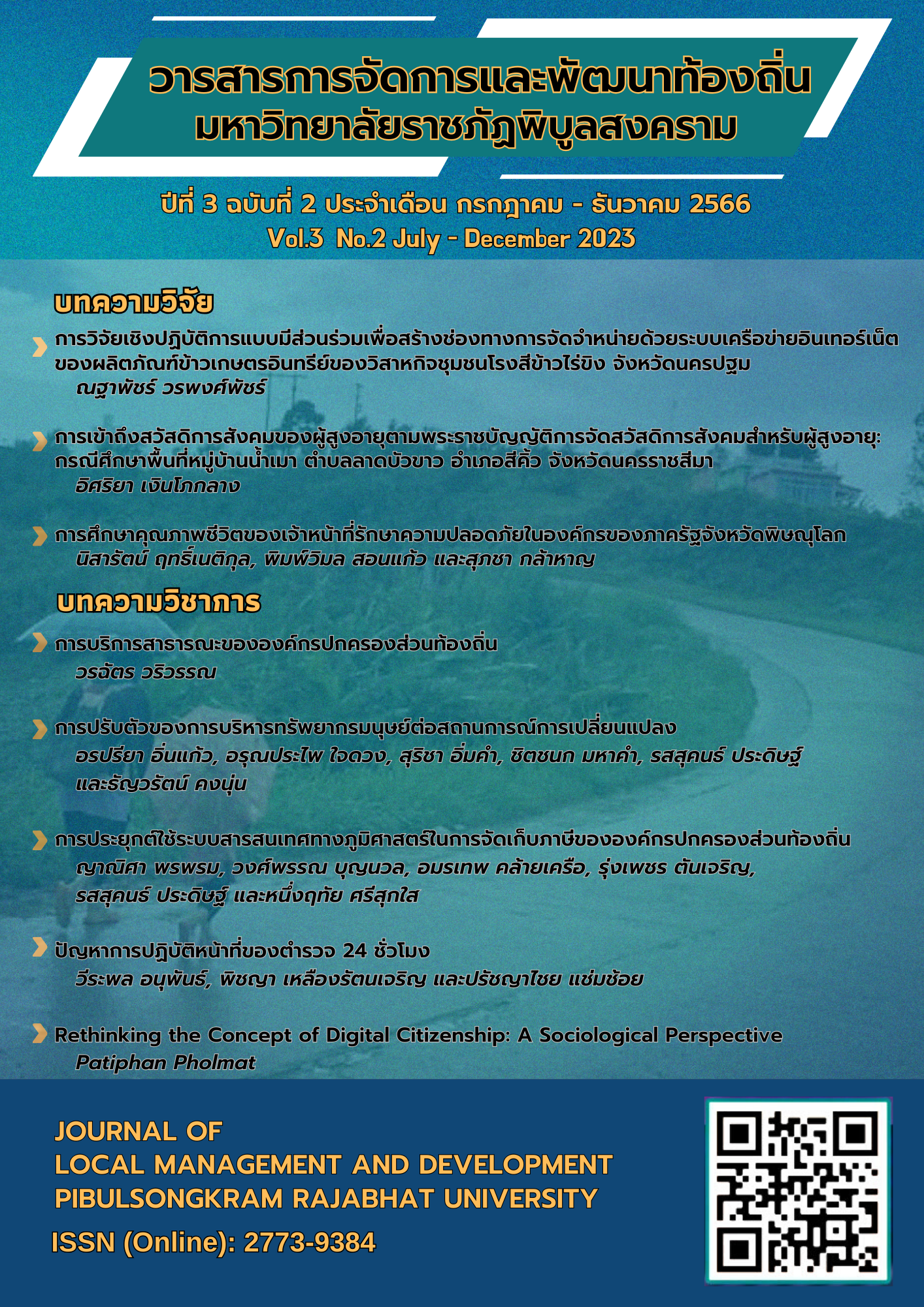Rethinking the Concept of Digital Citizenship: A Sociological Perspective
Keywords:
Digital Citizenship, Online Political Participation, SociologyAbstract
This academic article aimed to review the concept of digital citizenship from a sociological perspective. This was the origin of the concept of citizenship in a democratic regime. To ensure that everyone in the state and country had equal access to their rights. Therefore, it was a concept that was not just a description of the status of citizens. Rather, it described the practice of online political participation that included the ability to use digital tools, understanding social issues Including creating a mobilization network to fight against social injustice which is a characteristic of active citizens in a digital society. It was also found that the digital divide is a key issue of digital citizenship. Since people who do not had access to the internet and do not have the digital ability that may affect political participation in a democratic society and learning to develop oneself to be a good citizen of their country.
References
Calenda, D., & Meijer, A. (2009). Young people, the internet, and political participation. Information, Communication & Society, 12(6), 879–98.
Choi, M., Glassman, M., & Cristol, D. (2017). What it means to be a citizen in the internet age: Development of a reliable and valid digital citizenship scale. Computers & Education, 107, 100–112.
Dalton, R. J. (2008). Citizenship norms and the expansion of political participation. Political Studies, 56(1), 76-98.
Dobratz, B., Waldner, L., & Buzzell, T. (2016). Power, politics, and society: An introduction to political sociology. New York: Routledge
Emejulu, A., & McGregor, C. (2019). Towards a radical digital citizenship in digital education, Critical Studies in Education, 60(1), 131-147.
Fierro, P., Aroca, P., & Navia, P. (2020). How people access the internet and the democratic divide: Evidence from the Chilean region of Valparaiso 2017, 2018 and 2019. Technology in Society, 63, 101432. doi: 10.1016/j.techsoc.2020.1014 32.
Hoffmann, C., & Lutz, C. (2019). Digital divides in political participation: The mediating role of social media self-efficacy and privacy concerns. Policy & Internet, 13(1), 6-29.
Janoski, T, & Gran, B. (2002). Political citizenship: Foundations of rights. In E. F., Isin, & B. S. Turner. (eds.). Handbook of Citizenship Studies. (pp.13-52). London: SAGE Publications.
Lutz, C., Hoffmann, C. P., & Meckel, M. (2014). Beyond just politics: A systematic literature review of online participation. First Monday, 19(7). doi.org/10.5210/ fm.v19i7.5260
Marshall, T. H. (1950). Citizenship and social class and other essays. Cambridge: Cambridge University Press.
Mann, M. (1987). Ruling class strategies and citizenship. Sociology, 21(3). 339–54.
Mossberger, K., Tolbert, C. J., & McNeal, R. S. (2008). Digital citizenship: The internet, society, and participation. Massachusetts: MIT Press.
Norris, P. (2001). Digital divide: Civic engagement, information poverty, and the internet worldwide. Cambridge: Cambridge University Press.
Pholmat, P, & Promgird, P. (2022). The norm of digital citizenship and youths under the digital divide. Journal of Social Communication Innovation, 10(1), 50-57. (in Thai).
Ribble, M., & Bailey, G. (2007). Digital Citizenship in Schools. Washington DC: ISTE.
Theocharis, Y., & van Deth, J. W. (2018). Political participation in a changing world: Conceptual and empirical challenges in the study of citizen engagement. New York: Routledge.
Turner, B. S. (1990). Outline of a theory of citizenship. Sociology, 24(2). 189–217.
Turner, B. S. (1997). Citizenship studies: A general theory, Citizenship Studies, 1(1), 5-18.
Turner, B. S. (2000). Liberal citizenship and cosmopolitan virtue In A. Vandenberg. Citizenship and Democracy in a Global Era, London: MacMillan.

Downloads
Published
Issue
Section
License
Copyright (c) 2023 Journal of Local Management and Development Pibulsongkram Rajabhat University

This work is licensed under a Creative Commons Attribution-NonCommercial-NoDerivatives 4.0 International License.
ประกาศเกี่ยวกับลิขสิทธิ์
- เนื้อหาและข้อมูลในบทความที่ลงพิมพ์กับวิทยาลัยการจัดการและพัฒนาท้องถิ่นถือเป็นข้อคิดเห็น และความรับผิดชอบของผู้เขียนบทความโดยตรงซึ่งกองบรรณาธิการวารสารไม่จำเป็นต้องเห็นด้วย หรือร่วมรับผิดชอบใด ๆ
- บทความ ข้อมูล เนื้อหา รูปภาพ ฯลฯ ที่ได้รับการตีพิมพ์ในวิทยาลัยการจัดการและพัฒนาท้องถิ่นถือเป็นลิขสิทธิ์ของวารสารวารสารวิทยาลัยการจัดการและพัฒนาท้องถิ่น หากบุคคลหรือหน่วยงานใดต้องการนำทั้งหมดหรือส่วนหนึ่ง ส่วนใดไปเผยแพร่ต่อหรือเพื่อการกระทำการใด ๆ จะต้องได้รับอนุญาตเป็นลายลักษณ์อักษรจากวิทยาลัยการจัดการและพัฒนาท้องถิ่นก่อนเท่านั้น





